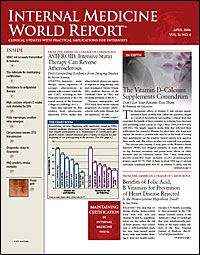Publication
Article
Internal Medicine World Report
Nasal Spray Outperforms Oral Therapy for Allergic Rhinitis
Author(s):
MIAMI—New evidence indicates that an intranasal antihistamine may be more effective than an oral antihistamine in treating the symptoms of seasonal allergic rhinitis, according to data presented at the 2006 American Academy of Allergy, Asthma & Immunology annual meeting.
Intranasal and oral second-generation antihistamines are currently considered first-line therapy for allergic rhinitis. However, clinical differences between the 2 types of antihistamines have not been well studied or demonstrated in controlled trials.
Ellen Sher, MD, of Atlantic Allergy, Asthma & Immunology Associates, Ocean, NJ, and colleagues examined data from two, 14-day, double-blind, multicenter studies involving 650 patients (median age, 35 years; 58% women) with moderate-to-severe seasonal allergic rhinitis. The 2 studies were similar in design.
A total of 323 patients were randomized to azelastine nasal spray (Astelin), 2 sprays per nostril twice a day, plus placebo tablets; and 327 patients were randomized to cetirizine (Zyrtec), 10 mg once daily, plus placebo nasal spray. The primary efficacy assessment was the change from baseline to day 14 in total nasal symptom score (TNSS), which includes rhinorrhea, sneezing, itchy nose, and nasal congestion.
Both treatments were very effective for symptom relief. But in the combined analysis, azelastine significantly im?proved the baseline TNSS score compared with cetirizine, by a mean of 32.5% ?versus 24.6%, respectively.
“These numbers are significant. Although both medications were better than placebo, we found that azelastine provided an incremental benefit over the 14-day period compared with cetirizine in the treatment of seasonal allergies. There were numerical improvements in every category. It is a little more effective than we might have thought,” said Dr Sher.
“The 2 agents were not much different in terms of side effects. Azelastine has a slightly bitter taste and that was reported in a small percentage [5.7%] of pa?tients. In previous studies, complaints over bitter taste were reported by 9% to 19% of patients. We now do a better job in managing this problem through better patient education,” Dr Sher told IMWR.
Gillian Shepherd, MD, of Weill Medical College of Cornell University, New York City, commented that although these findings are interesting, further studies are warranted to determine which patients may do better on one medication over the other.
“They are both antihistamines, so the only difference should be local nasal concentration,” said Dr Shepherd. “If the results hold up to statistical analysis, and it can be shown that there is limited systemic absorption, the nose spray might be helpful for some patients who cannot tolerate oral antihistamines, such as men with enlarged prostates.”





